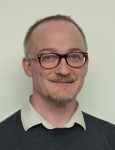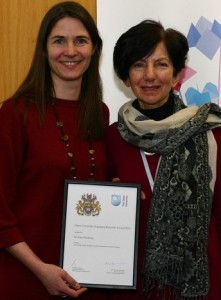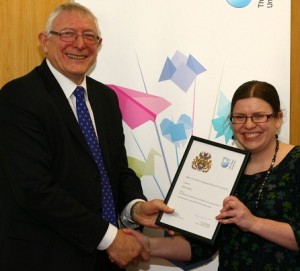The winners of the Open University’s 2015 Engaging Research Award Scheme were announced in early February 2015.
The scheme was devised as part of the Open University’s RCUK-funded Public Engagement with Research Catalyst. It was designed to find and celebrate high-quality engaged research at the OU, demonstrating the different ways that researchers meaningfully interact with various stakeholders over any or all stages of a research process, from issue formulation, the production or co-creation of new knowledge, to knowledge evaluation and dissemination.
As the Chair of the Assessment Panel, I was extremely grateful to the six judges for their careful assessments of the entries. I was particularly delighted that two of the winners for the 2014 Engaging Research Award Scheme, Thea Herodotou and Natalia Kucirkova, agreed to act as judges for this 2015 competition.
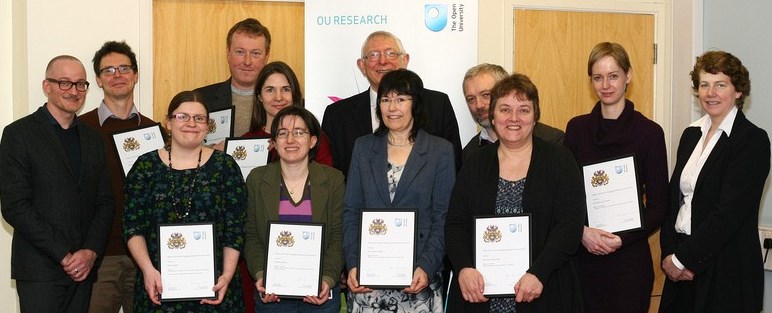
2015 Engaging Research Award Winners and Highly Commended Entries: L-R: Richard Holliman, Paul Stenner, Katy Jordan, Graham Pike, Rosa Hoekstra, Francesca Benatti (on behalf of Elton Barker), Alan Bassindale, Verina Waights, Martin Weller, Cindy Kerawalla, Saskia van Manen and Fiona McKerlie. Photo: Chris Valentine.
The standard of the entries to this round of the scheme was very high, with the judging panel awarding prizes to three winners of the scheme as well as recognizing six further highly commended entries.
Winners
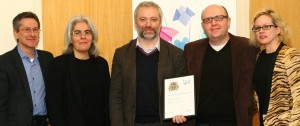
Members of the OERRH Team: Patrick McAndrew, Beatriz de los Arcos, Martin Weller, Robert Farrow and Beck Pitt. Photo: Chris Valentine.
Professor Martin Weller (Institute of Educational Technology)
‘The Open Educational Resources Research Hub’
The OER Research Hub (OERRH) is a Hewlett funded research project investigating the impact of open educational resources (OER) on learning and teaching. This winning entry focused on the openly licensed Open Research course that the team created and ran on P2PU’s School of Open during Sept-Oct 2014, which acted as a culmination of their open research approach.
The judging panel was particularly impressed by the quality of the engaged research; a range of relevant stakeholders and publics were engaged meaningfully in this densely participative research. The OERRH Team demonstrated clear evidence of collective impact, quality and progress.
Dr Rosa Hoekstra (Faculty of Science)
‘Increasing mental health & autism awareness in rural Ethiopia’
In 2012 a team of researchers from the Open University and Addis Ababa University received funding from the charity Autism Speaks to conduct a study of the effectiveness of mental health training for community health workers in Ethiopia.
Rural Ethiopian community health workers provide essential health services to a population of 80 million people. Through this engaged research the team aimed to raise the awareness of autism and other developmental disorders and decrease stigma related to mental health problems.
The judging panel commended the impressive involvement of a distributed user community, with relevant participants involved in various stages of the project, through a mixture of methodologies seeking to understand their attitudes and practices.
Katy Jordan (Institute of Educational Technology)
‘The characteristics of completion rates of distributed and centralised MOOCs’
Supervision Team: Dr. Canan Blake and Professor Martin Weller
Massive Open Online Courses (MOOCs) have the potential to enable free university-level education on an enormous scale. A concern often raised about MOOCs is that although thousands enrol for courses, a very small proportion actually complete the course. Katy’s research explored data about enrollment numbers and completion rates from across online news stories and blogs. The processes of engagement emerged and became embedded as the research progressed, demonstrating meaningful engagement.
The panel described this as a gripping example participative and open research, extremely impressive for a postgraduate research student.
Highly Commended Entries
Professor Graham Pike (Faculty of Social Sciences)
‘Facing the evidence: collaboratively developing technology, policy and procedures to improve police investigations’
The panel was impressed by the clear involvement of relevant stakeholders in setting up the research and in dissemination.
Dr Elton Barker (Faculty of Arts)
‘Peliagios: Linking together the places of our past through the documents that refer to them’
Relevant stakeholders and non-academic partners were clearly identified and appropriate, and the aims and objectives were shaped in consultation with them.
Dr Cindy Kerawalla (Faculty of Education and Language Studies)
‘Empowering the children and young people as researchers’
The engaged research is based on processes of participatory research, empowering and engaging young people in the co-production of research, proposing, creating, implementing and sharing findings from their investigations.
Dr Verina Waights (Faculty of Health & Social Care)
‘Enhancing e-Inclusion through development of carers’ digital skills’
The research took a participatory design approach with evidence of engagement through many stages of the lifecycle.
Professor Paul Stenner (Faculty of Social Sciences)
‘An exploration of self-management in chronic lower back pain disorder’
This research demonstrates the benefits of service user engagement through the lifecycle of the project from design to analysis and dissemination.
Dr Saskia van Manen (Faculty of Science)
‘Co-ideation for disaster risk management at Turrialba volcano, Costa Rica’
This research engages stakeholders, relevant publics, and academics from a range of academic disciplines, using participatory approaches in disaster risk management at active volcanoes. The work is clearly merit worthy, not least because the research engages a range of stakeholders in a diverse cultural setting.

